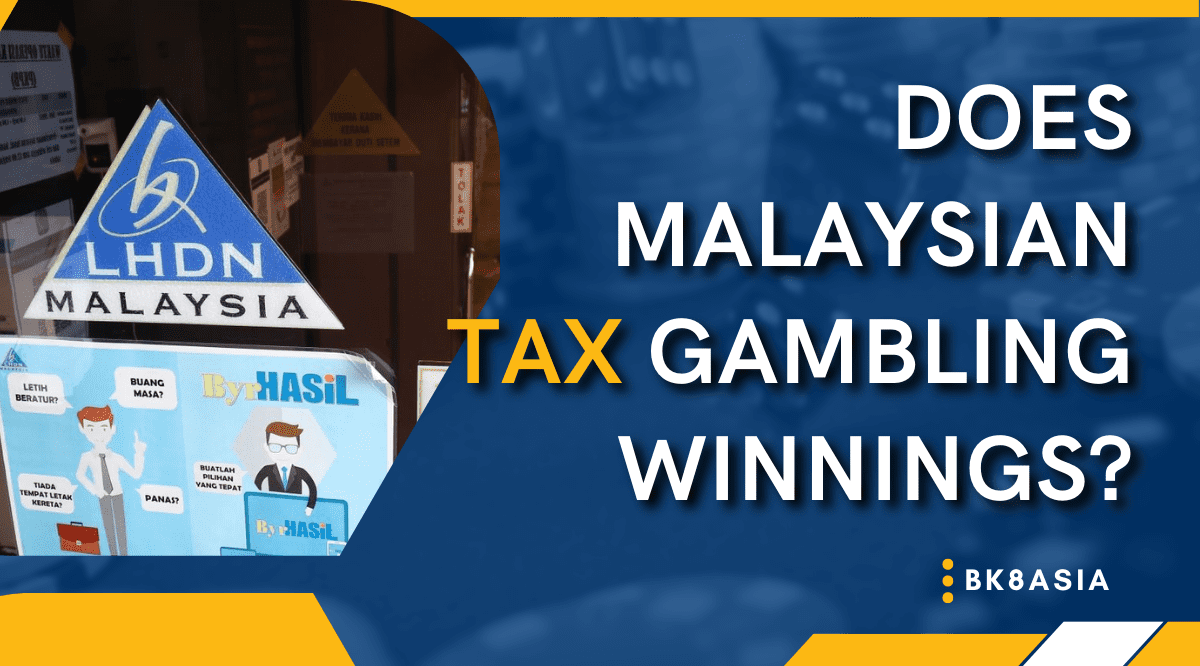Does Malaysian Tax Gambling Winnings?

Table of Contents
Gambling is a popular activity enjoyed by many people all around the world. However, as with any other form of income, gambling winnings are subject to taxation in many countries. Understanding the tax laws related to gambling is important for gamblers to ensure that they comply with regulations and avoid any penalties.
Malaysia is a country that has strict laws when it comes to gambling. In this article, we will discuss the taxation of gambling winnings in Malaysia and provide an overview of Malaysian tax laws.
Definition of Gambling
Gambling is the act of betting or wagering money or something of value on an event with an uncertain outcome, with the intention of winning additional money or material goods.
Importance of Understanding Tax Laws for Gamblers
Understanding the tax laws related to gambling is important for several reasons. Firstly, it helps gamblers to know their tax obligations and avoid penalties for non-compliance. Secondly, it allows them to plan their finances and make informed decisions about their gambling activities. Finally, it helps them to maximize their after-tax winnings and minimize their tax liability.
Overview of Malaysian Tax Laws
The Malaysian tax system is based on the Self-Assessment System (SAS), which requires taxpayers to declare their income and compute their own tax liability. The main types of taxes levied in Malaysia include income tax, goods and services tax (GST), and excise duty. The Inland Revenue Board of Malaysia (IRBM) is the government agency responsible for administering and enforcing the tax laws in Malaysia.
In the next sections of this article, we will discuss the taxation of gambling winnings, tax implications for different types of gambling activities, reporting requirements for gambling winnings, tax planning strategies for gamblers, and the international taxation of gambling winnings for Malaysian gamblers.
Taxation of Gambling Winnings in Malaysia
In Malaysia, gambling winnings are considered income and are therefore subject to taxation. This includes winnings from casino games, sports betting, lotteries, and online gambling.
Taxation of Gambling Winnings in Malaysia
Gambling winnings in Malaysia are subject to income tax under the Income Tax Act 1967. This means that all gambling winnings, regardless of the amount, must be declared as income and are subject to tax.
The threshold for Taxation of Gambling Winnings
In Malaysia, there is no minimum threshold for the taxation of gambling winnings. This means that all gambling winnings, regardless of the amount, are subject to taxation.
Types of Taxes Levied on Gambling Winnings in Malaysia
There are two types of taxes levied on gambling winnings in Malaysia: income tax and gaming tax.
Income tax is a direct tax that is levied on all income earned by individuals in Malaysia, including gambling winnings. The tax rate for income tax is progressive and ranges from 0% to 30%, depending on the amount of income earned.
A gaming tax is an indirect tax that is levied on the gross gaming revenue of casinos and gaming operators. The tax rate for gaming tax is fixed at 25%.
Tax Rates for Gambling Winnings in Malaysia
The tax rate for gambling winnings in Malaysia is the same as the tax rate for other forms of income. The tax rate for income tax in Malaysia is progressive and ranges from 0% to 30%, depending on the amount of income earned.
For example, if a gambler earns RM 50,000 in gambling winnings during the year, they would be subject to income tax at a rate of 15%, which would result in a tax liability of RM 7,500.
In summary, all gambling winnings in Malaysia are subject to income tax and are taxed at the same rates as other forms of income. In addition, casinos and gaming operators are subject to gaming tax on their gross gaming revenue. It is important for gamblers to understand their tax obligations and to comply with the tax laws in Malaysia to avoid penalties for non-compliance.
Gambling Taxes in Malaysia
Gambling is a heavily regulated activity in Malaysia, with strict laws governing the industry. As a result, gambling taxes in Malaysia are a significant source of revenue for the government. In this section, we will provide an overview of the Malaysian tax system, discuss the types of taxes levied in Malaysia, and focus specifically on the betting and gambling taxes in Malaysia.
Overview of the Malaysian Tax System
The Malaysian tax system is based on a self-assessment system, which means that taxpayers are responsible for calculating and reporting their own tax liability. The Inland Revenue Board of Malaysia (IRBM) is the government agency responsible for administering and enforcing the tax laws in Malaysia.
Direct Taxes in Malaysia
Direct taxes are taxes that are levied on the income or wealth of individuals and companies. In Malaysia, the main direct tax is income tax, which is levied on all income earned by individuals and companies in Malaysia. The tax rates for income tax are progressive and range from 0% to 30%, depending on the amount of income earned.
Indirect Taxes in Malaysia
Indirect taxes are taxes that are levied on the consumption of goods and services. In Malaysia, the main indirect taxes are the goods and services tax (GST) and the sales and service tax (SST). The GST was introduced in 2015 and was replaced by the SST in 2018. The SST is a single-stage tax levied on the sales of goods and services.
Betting and Gambling Taxes in Malaysia
In addition to income tax and indirect taxes, there are specific taxes that are levied on betting and gambling activities in Malaysia. These taxes are levied on the operators of gambling facilities, rather than on individual gamblers.
The main tax on gambling operators in Malaysia is the gaming tax. This tax is levied on the gross gaming revenue of casinos and gaming operators at a fixed rate of 25%. The gaming tax is payable on a monthly basis and is based on the gross gaming revenue generated during the month.
In addition to the gaming tax, there are also other taxes and fees that are levied on gambling operators, including licensing fees and regulatory fees. These fees and taxes vary depending on the type of gambling activity and the size of the operator.
The Malaysian tax system is based on a self-assessment system, with income tax as the main direct tax and the SST as the main indirect tax. Betting and gambling activities are subject to specific taxes, including the gaming tax, which is levied on the gross gaming revenue of casinos and gaming operators. It is important for gambling operators to understand their tax obligations and to comply with the tax laws in Malaysia to avoid penalties for non-compliance.
Tax Implications for Different Types of Gambling Activities
Different types of gambling activities in Malaysia have different tax implications. In this section, we will discuss the tax implications for various types of gambling activities, including casino gambling, sports betting, lottery winnings, online gambling, and professional gambling.
Casino Gambling
Casino gambling is one of the most popular forms of gambling in Malaysia, with several casinos operating in the country. The taxation of casino gambling winnings is the same as for other forms of gambling in Malaysia. All casino gambling winnings, regardless of the amount, are considered income and are subject to income tax at progressive tax rates.
Sports Betting
Sports betting is another popular form of gambling in Malaysia, with many people placing bets on sports events. The taxation of sports betting winnings is the same as for other forms of gambling in Malaysia. All sports betting winnings, regardless of the amount, are considered income and are subject to income tax at progressive tax rates.
Lottery Winnings
Lottery winnings in Malaysia are subject to both income tax and gaming tax. Lottery winnings are considered income and are subject to income tax at progressive tax rates. In addition, lottery operators are subject to gaming tax on their gross revenue from lottery sales.
Online Gambling
Online gambling is a growing industry in Malaysia, with many people playing casino games and placing bets online. The taxation of online gambling winnings is the same as for other forms of gambling in Malaysia. All online gambling winnings, regardless of the amount, are considered income and are subject to income tax at progressive tax rates.
Tax Implications for Professional Gamblers
Professional gamblers in Malaysia are individuals who derive their primary source of income from gambling activities. Professional gamblers are subject to the same tax rules as other gamblers in Malaysia. All gambling winnings, regardless of the amount, are considered income and are subject to income tax at progressive tax rates.
Professional gamblers are also eligible for tax deductions for their gambling losses. The deductions are subject to certain limitations and must be supported by proper documentation.
The tax implications for different types of gambling activities in Malaysia are generally the same. All gambling winnings, regardless of the amount, are considered income and are subject to income tax at progressive tax rates. Professional gamblers are subject to the same tax rules as other gamblers but are eligible for tax deductions for their gambling losses.
Reporting Gambling Winnings in Malaysia
Reporting gambling winnings in Malaysia is a legal requirement, and failure to do so can result in penalties. In this section, we will discuss the obligation to report gambling winnings, the forms for reporting gambling winnings, the deadline for reporting gambling winnings, and the penalties for failure to report gambling winnings.
Obligation to Report Gambling Winnings
In Malaysia, all gambling winnings, regardless of the amount, casino winnings must be declared to LHDN as income and are subject to income tax. This means that it is the obligation of the gambler to report their winnings to the Inland Revenue Board of Malaysia (IRBM).
Forms for Reporting Gambling Winnings
The forms for reporting gambling winnings in Malaysia are the same as those for reporting other types of income. Individual taxpayers must file their tax returns using Form BE (Borang BE), while corporate taxpayers must file their tax returns using Form C (Borang C).
Deadline for Reporting Gambling Winnings
The deadline for reporting gambling winnings in Malaysia is the same as for other types of income. The tax year in Malaysia runs from 1 January to 31 December, and taxpayers must file their tax returns by 30 April of the following year. For example, tax returns for the year 2021 must be filed by 30 April 2022.
Penalties for Failure to Report Gambling Winnings
Failure to report gambling winnings in Malaysia can result in penalties. The penalty for late submission of tax returns is RM 200, with an additional penalty of 1% of the tax payable for each month of delay. In addition, failure to report income can result in penalties of up to three times the tax payable, as well as imprisonment for up to six years.
Tax Planning for Gamblers in Malaysia
Tax planning is an important aspect of managing gambling winnings in Malaysia. In this section, we will discuss strategies for minimizing taxes on gambling winnings, tax deductions for gambling losses, and record-keeping for gambling winnings.
Strategies for Minimizing Taxes on Gambling Winnings
One strategy for minimising taxes on gambling winnings in Malaysia is to offset gambling losses against gambling winnings. This can be done by keeping accurate records of all gambling activities, including the dates and amounts of bets placed and any winnings or losses incurred.
Another strategy is to make use of tax deductions, such as charitable donations or deductions for business expenses. These deductions can help to reduce the overall tax liability on gambling winnings.
Tax Deductions for Gambling Losses
In Malaysia, tax deductions are available for gambling losses incurred by professional gamblers. These deductions are subject to certain limitations and must be supported by proper documentation.
Record Keeping for Gambling Winnings
Keeping accurate records of gambling activities is important for tax planning and compliance in Malaysia. Gamblers should keep records of all gambling activities, including the dates and amounts of bets placed, any winnings or losses incurred, and any expenses incurred related to gambling activities. These records should be kept for at least seven years, as they may be required by the IRBM during tax audits.
Reporting gambling winnings is a legal requirement in Malaysia, and failure to do so can result in penalties. Gamblers can minimize their tax liability by using strategies such as offsetting gambling losses and making use of tax deductions. Accurate record-keeping is also important for tax compliance and planning purposes.
Impact of Taxation on Malaysian Gamblers
The taxation of gambling winnings in Malaysia can have various impacts on gamblers and the economy. In this section, we will discuss the impact of high taxes on Malaysian gamblers, the impact of low taxes on the Malaysian economy, and the social impacts of gambling taxation.
Impact of High Taxes on Malaysian Gamblers
High taxes on gambling winnings can have a significant impact on Malaysian gamblers, especially those who gamble frequently or rely on gambling as a source of income. High taxes can reduce the number of winnings that gamblers take home, which can reduce their incentive to gamble.
In addition, high taxes can drive gamblers to seek out illegal or unregulated gambling activities, which can have negative social and economic impacts.
Impact of Low Taxes on the Malaysian Economy
Low taxes on gambling winnings can have a positive impact on the Malaysian economy. Lower taxes can encourage more people to gamble, which can increase revenue for the government and support the development of the gambling industry in Malaysia.
In addition, lower taxes can make Malaysia a more attractive destination for international gamblers, which can boost tourism and bring in foreign currency.
Social Impacts of Gambling Taxation
Gambling taxation can also have social impacts. High taxes on gambling winnings can reduce the amount of money that gamblers have available for other expenses, such as housing, food, and healthcare. This can have a negative impact on the well-being of gamblers and their families.
In addition, gambling taxation can help to fund social programs and services, such as education, healthcare, and social welfare. This can have positive social impacts by providing support for vulnerable and disadvantaged populations.
Conclusion
In conclusion, the taxation of gambling winnings in Malaysia is an important issue that can have various impacts on gamblers and the economy. High taxes can discourage gambling and drive gamblers to seek out illegal activities, while low taxes can support the development of the gambling industry and boost the economy.
Taxation can also have social impacts by affecting the well-being of gamblers and their families, and by providing support for social programs and services.
Future Outlook of Gambling Taxation in Malaysia
The future outlook of gambling taxation in Malaysia is uncertain. The government may choose to increase or decrease taxes on gambling winnings based on economic and social considerations. It is important for gamblers to stay informed about any changes to the tax laws and to comply with the tax requirements in Malaysia.
Relevant news

Have You BK8?
You must have heard the slogan “Have You BK8? or 你BK8了吗” in social media or…

Tips for Gambling Online With a Small Budget
Online gambling has become increasingly popular over the years, offering a convenient and accessible way…

BK8 Year of Rabbit 2023 Gold Bar Deposit Reward
In addition to being one of Malaysia's most well-known online casinos, BK8 is also well-known…

What is a Heylink or Joylink Bonus Casino?
There has been a rise in the availability of free credit bonuses in Malaysia in…

Tips for Playing Safely at Online Casinos
The safety of your personal information is of paramount importance while gambling online. If you…

Genting Casino vs Online Casino
Since the dawn of time, gambling and casinos have been an integral part of our…


